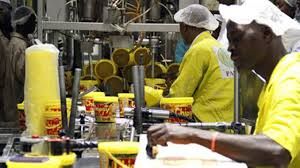Nigerian Manufacturers’ revenues rose by 78.7 percent to N2.27 trillion in the first quarter (Q1) of 2023. This, however, did not translate to profits as the earnings were eroded by Naira devaluation.
This was contained in the latest financial statements of 13 listed consumer goods firms. The report showed that their revenue increased by 78.7 percent to N2.27 trillion in the first quarter of 2024. This is an increase from N1.27 trillion in the same period of last year, 2023.
The firms listed are: Dangote Cement Plc, BUA Foods Plc, Nigerian Breweries Plc, Nestle Nigeria Plc, and BUA Cement Plc. Also listed are Lafarge Africa Plc, Dangote Sugar Refinery Plc, International Breweries Plc, Guinness Nigeria Plc and Unilever Nigeria Plc. Others are Cadbury Nigeria Plc, NASCON Allied Industries Plc and Champion Breweries Plc.
According to the report, these earnings mean little in real terms due to Naira devaluation and inflation.
“What crippled the performance of businesses in Nigeria are exogenous actors. The biggest blow to the companies is the foreign exchange (FX). Ninety percent of them would have done well if the FX crisis was not there. Revenue will still grow because our local productivity is still short of demand and the population is still growing.” Damilare Asimiyu, macroeconomic strategist & head of investment research at Afrinvest West Africa Limited, stated
Asimiyu noted that most Nigerian companies learnt a lot during COVID-19 in terms of managing their costs of sales. This is even as many of them have a lot partnerships that help them get their raw materials.
Asimiyu further added that some firms have also reduced their reliance on importing raw materials to a large extent.
“Breweries and consumer firms are now sourcing their materials locally. But the 30-40 percent they’re still exposed to externally is what affected them.
“So, fix the environment, don’t let finance costs be high, and businesses will do well,” Asimiyu said.
Further analysis from the report shows that Dangote Cement recorded the highest revenue of N817.4 billion. He was followed by BUA Foods with N356.9 billion. The Nigerian Breweries (N227.1 billion), Nestle (N 183.5 billion) and BUA Cement (N161.1 billion).
Concurring with Asimiyu, the Chief Executive of the Centre for the Promotion of Private Enterprise, CPPE, Mud Yusuf said, “I believe that if not for the FX in terms of profitability, manufacturers would have performed much better. This is because the FX component of that cost would be less.”
The report listed companies that post losses in the Q1. The seven firms are International Breweries, Cadbury Nigeria, Nigerian Breweries, Nestlé, Dangote Sugar Refinery, Champion Breweries, and Guinness Nigeria. They posted a combined loss of N388.6 billion in Q1.
Of the six remaining firms, BUA Cement recorded a decline of 37.6 percent, Lafarge Africa, 65.2 percent and NASCON, 24.9 percent.
However, the remaining three posted increases in profit. They include: BUA Foods, Unilever Nigeria, and Dangote Cement . They posted a combined profit of N171.9 billion, up from N152.6 billion in the same period of 2023.
According to analysts, the further devaluation of the Naira coupled with rising interest rates led to increased operating costs for the companies. Particularly the multinationals whose major costs are denominated in foreign currencies.
It stated that the Naira suffered a near 30 percent devaluation this year. This is followed by 40 percent devaluation last June.
“The Naira devaluation has, therefore, put more pressure on the margins of companies already dealing with double-digit inflation rates and the weak purchasing power of consumers.
“A lot of consumer firms had higher finance costs. This is because of FX losses and higher interest rates, ” a Lagos-based investor relations analyst, Ayorinde Akinloye, said.
“Despite some of them having good operating performance, their profit declined. While others recorded huge losses,” he noted.
According to him, “the losses affected tax payments to the Federal Government. This is as manufacturers’ contributions dropped to the lowest in three years in the first quarter of 2024.
Recall that the latest Company Income Tax (CIT) report from the National Bureau of Statistics (NBS), stated that the tax revenue from both local and foreign manufacturing firms fell by 70.4 percent to N43.2 billion in Q1 from N145.1 billion in the same period of last year.
Giving reason for this, the Managing Director/Chief Executive Officer at Coleman Technical Industries Limited, George Onafowokan, said instability and inconsistency in the currency. He noted that this is coupled with insecurity, creates problems for many businesses.
“You will limit what you have been able to do or limit your exposure. The erosion of working capital for businesses, especially for manufacturers, is happening massively,” he said.
Recall that over the past eight years, Nigeria has slumped into two recessions. And this is owing to the collapse of oil prices, disruptions caused by the COVID-19 pandemic, and an inability of the government to reform the economy.
Recall also that President Bola Tinubu on his assumption of office last year May, implemented bold reforms. These included the removal of petrol subsidy and Naira devaluation. These policies were to boost revenues for the welfare of the Nigerian citizens.
However, more than one year after, the reforms have increased inflationary pressures. They have also weakened the purchasing power of consumers, even as businesses grapple with higher operating costs.
Data from the NBS shows that the headline inflation quickened for the 17th straight time in 2024. It rose to 34.19 percent in June, up from 33.95 percent in May.
“Food inflation, which constitutes more than 50 percent of headline inflation, also increased to 40.87 percent from 40.66 percent,” NBS said.
Source: BusinessDay
Follow us for more news on our WhatsApp News Channels @
https://whatsapp.com/channel/0029VaC505jB4hdZ5Yx9g82U
![]()

